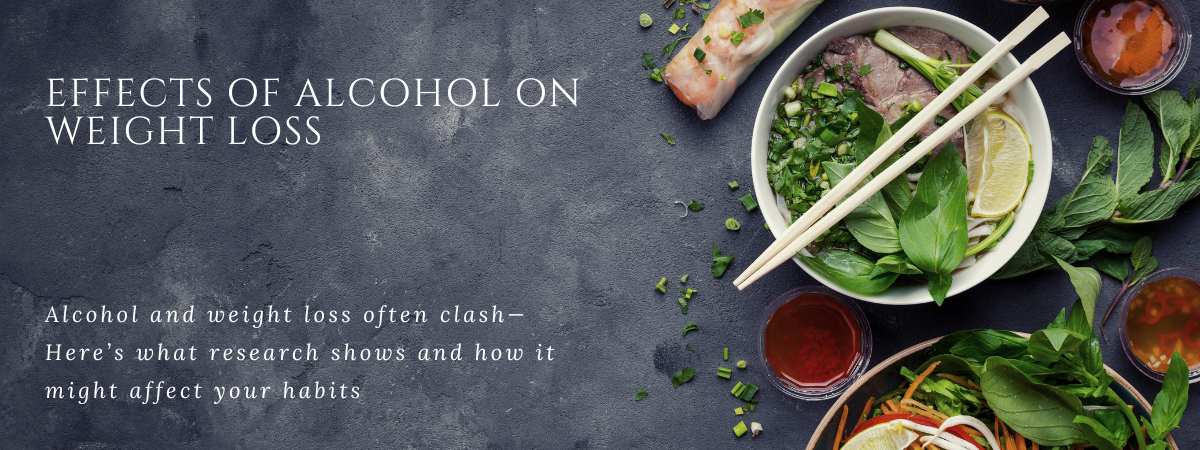
Kelly Myers, MS, RDN, LDN
Alcohol and Weight Loss: What the Research Tells Us
Have you been told to avoid alcohol when trying to lose weight? Research appears to be neutral on whether alcohol intake can influence weight gain directly. Despite this, there are notable reasons to consider when exploring how alcohol intake can influence your progress on any journey towards healthy lifestyle change and weight management.
To start, drinking alcohol can influence meal timing and skew our understanding of our appetite. After a drink or two, our body’s mechanisms to recognize satiety (the sensation of feeling full) start to drop off. Some research suggests a positive relationship between alcohol intake and the desire, or stimulation, to eat something. Compared to other caloric macronutrients, like protein or carbohydrates, alcohol actually has more energy density. This means that 1g of alcohol has a caloric value of 7 calories per gram, which is almost double that of protein and carbohydrates, which are both valued at 4 calories per gram.
When you are trying to practice more mindful eating, alcohol can skew your perception of both hunger (feeling hungrier than you actually are) and satiety (not feeling as full). Add in the caloric surplus that alcohol provides, and you can see how this pattern could easily influence a tendency to gain weight (or prevent you from losing weight) if you are not considering alcohol. It has been shown that people who drink alcohol consume more calories compared to those who do not drink alcohol, at a given mealtime. To put it simply, this pattern can suggest that having a drink will increase your likelihood of eating more than you may need or had originally planned.
Mindful Drinking and Caloric Intake
Let’s break this down a little further. Current recommendations define moderate drinking as 1 serving of alcohol a day for women and 2 servings a day for men. This is equivalent to 12 oz beer, 5 oz wine, 1.5 oz distilled spirits, or 8 oz malt liquor.
Let’s say you go to Happy Hour. You start off with one serving of alcohol which averages anywhere between 70–150 calories per beverage (not accounting for any calories from mix-ins or flavor enhancers). As time goes on, you start to feel hunger that you normally would not at this time, and you may order an appetizer. Before you know it, you order another drink and the cycle spurs on. Or maybe you have just one drink and then go home, only to find that the portions you eat at dinner are larger than usual portions at this time of day.
If we were to compare this example to another day where you did not partake in an event where the stimulus to drink alcohol was higher (Happy Hour for example), we can see the increased caloric intake pretty easily. Now if this happens 2–3 days a week and at the expense of other things you could be doing at this time (like exercise for example), we can start to see a pattern towards weight gain or lack of weight loss related to the unaccounted-for caloric surplus.

Nutrient Considerations and Lifestyle Choices
Another thing to consider with drinking is whether certain nutrients are being removed at the expense of your beverage. Are we replacing a meal or snack that has balanced nutrients with an alcoholic beverage? This is something to consider and review with your dietitian to find out.
So, should you avoid alcohol when you are trying to make some healthy lifestyle changes? The answer truly depends. When I work with clients, I like them to really think about the when and the why behind their drinking patterns. Is it done with mindfulness and accountability towards their goals or is it a habit that is leading them into unhealthy patterns? Do they have medical reasons to avoid alcohol? Are they experiencing a plateau in their goals?
Individualization is key. In summary, there is yet to be a direct “yes” or “no” behind whether alcohol on its own leads to weight gain. However, we can see how the inclusion of regular consumption of alcohol is something to at least consider when wanting to make healthy lifestyle choices and support sustainable weight loss. It may be less about the drink itself and more about how we respond and interact with alcohol that needs to be changed or reviewed.

Kelly Myers
MS, RD, LDN
Kelly is a Licensed and Registered Dietitian Nutritionist with a passion for helping individuals and families. She completed her Bachelor’s Degree in Food Science and Human Nutrition…. READ MORE
References
-
- Traversy G, Chaput JP. Alcohol Consumption and Obesity: An Update. Curr Obes Rep. 2015;4(1):122-130. doi:10.1007/s13679-014-0129-4
- Fong M, Scott S, Albani V, Adamson A, Kaner E. ‘Joining the Dots’: Individual, Sociocultural and Environmental Links between Alcohol Consumption, Dietary Intake and Body Weight-A Narrative Review. Nutrients. 2021;13(9):2927. Published 2021 Aug 24. doi:10.3390/nu13092927

